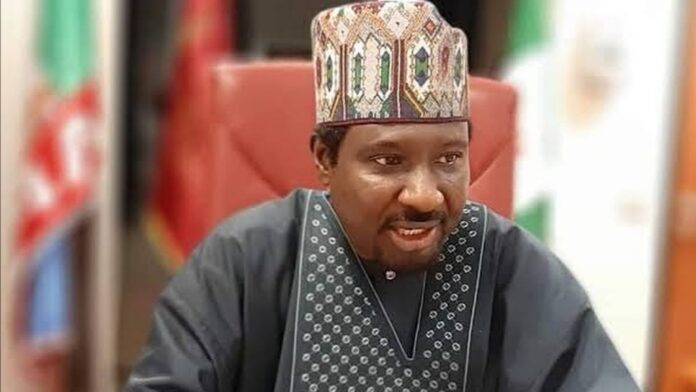Over the years, Jibrin is renowned to have significantly deepened his sterling legislative experience and unrivaled parliamentary accomplishments.
By Austin Uganwa
As the count down to the inauguration of the tenth National Assembly has begun intensely, the jostle for the principal positions in the Senate and House of Representatives has naturally but steadily been reinforced. The situation which is unfolding rather feverishly is a statutory process that takes its turn periodically, culminating in the emergence of leaders to steer the affairs of the federal legislature within a term of four years as stipulated by the 1999 constitution of Nigeria as amended.
Consequently, the parliamentary space has become increasingly boisterous again. Some lawmakers-elect are now busy expressing interests in one position or another and engaging their colleagues, accordingly. Several others have collapsed into groups to back aspirants of their choice. Nocturnal meetings, to be sure, have inherently become imperative while the aspirants are embarking on endless consultations with top political gladiators in determined moves to outstrip one another.
Although the intrigues for the principal positions are mounting on daily basis with the inauguration date wearing on, the scheming for the positions of the President of the Senate and that of the Deputy Senate President appears to be more intense, intricate and largely escalating. This is unsurprising, for many reasons. First, Senate President is the first among other principal positions in NASS. Both the Senate and House rule recognizes the President of the Senate as the chairman of the National Assembly. The Senate President as a result presides over all the joint sessions of the National Assembly.
Besides, the 1999 constitution of Nigeria as amended confers on the Senate alone the power to approve key government appointments such as: Appeal and Supreme Courts Justices; Ministers; Ambassadors; Heads and Commissioners of key agencies, including the Independent National Electoral Commission, Federal Character Commission, Economic and Financial Crimes Commission, Central Bank of Nigeria.
READ ALSO: Inaugurating a new President on May 29 is not absolute
The Senate singly is also constitutionally mandated to endorse President’s plan to deploy troops outside the country, among others. These constitutional prescriptions as a result place the presiding officers of the Senate: the Senate President and his deputy at a strategic position to provoke good governance and national development, and in view of this, underpinning the importance of the two positions
The foregoing insights are instructive of the critical and weighty roles, duties and responsibilities of the presiding officers of the Senate. This realization makes it imperative for the in-coming Senators to ensure that the right persons are elected for the Senate leadership jobs. As observed by some Senators during their engagement with Parliamentary Advocacy Network at the National Assembly in April this year, the unassailable person for the Senate presidency must be one who is competent, experienced; well-grounded in parliamentary processes and possesses the balanced attribute to harness and harmonize the differing preferences and interests of the legislators towards forging parliamentary consensus and national development.
However, Senator Barau Jibrin, current chairman, Senate Committee on Appropriation, who represents Kano North in the upper legislative chamber, a major contender in the Senate Presidency race is largely perceived by many as a prime candidate and most suitable for the job. The reasons behind this avowed penchant for Jibrin may not be far-fetched. Jibrin is celebrated by a good number of his colleagues as a bridge-builder, highly experienced in legislative duties, a rallying point who has demonstrated excellent parliamentary leadership over the decades in both the House of Representatives and the Senate.
At inception of the fourth republic National Assembly in 1999, Jibrin was one of the founding members of the House who turned out to be one of the key legislators that bestrode the legislature as a colossus. He worked closely with Ghali Umar Na’abba, the Speaker at that time to design a four-year innovative and efficient legislative agenda code named; “House Contract with Nigeria” which contained programmes and policies the House planned to embark on, to meet the basic needs of the people; improve public welfare and sectoral development. He was also deeply involved in developing Minimum Infrastructure Bills, a broad and integrated legislative master plan to drive infrastructural development in Nigeria.
As the chairman of the House Committee on Appropriation in 1999, Jibrin superintended the first budgetary process in the fourth republic, initiating and sustaining for four years, robust budgetary framework that emboldened House committee heads to take on ministers and agency heads on policy issues that engendered enhanced budget implementation. He was thus in the forefront of those who laid the National Assembly’s solid foundation at inception and also ensured the redefinition and reform of the legislative agenda in line with the global recommendations at the wake of the new millennium in 2000.
Over the years, Jibrin is renowned to have significantly deepened his sterling legislative experience and unrivaled parliamentary accomplishments. Not a few Senators have variously acknowledged his uncommon records in the Senate in the past eight years as chairman Senate Committee on Tertiary Education and TETFUND and currently Appropriation Committee. Concerned about the infrastructural decay in the North-West, Jibrin in 2019 sponsored a bill seeking the establishment of North-West Development Commission. The bill was designed to serve as a catalyst to develop potentials in the North and to address the infrastructural gaps in the region.
Apart from experience, Jibrin has evidently demonstrated ample parliamentary leadership qualities, liberal disposition and ability to manage lawmakers and their differing legislative positions and cleavages. He is therefore generally recognized to have a profound aptitude to drive a cohesive, unifying, responsive and productive Senate capable of evolving and implementing in the most efficient fashion a purposeful legislative agenda that would meet the needs and aspirations of a vast majority of Nigerians across the six geo-political zones of the country.
• Dr. Austin Uganwa, public affairs analyst, who teaches at National Open University of Nigeria, wrote from Abuja













